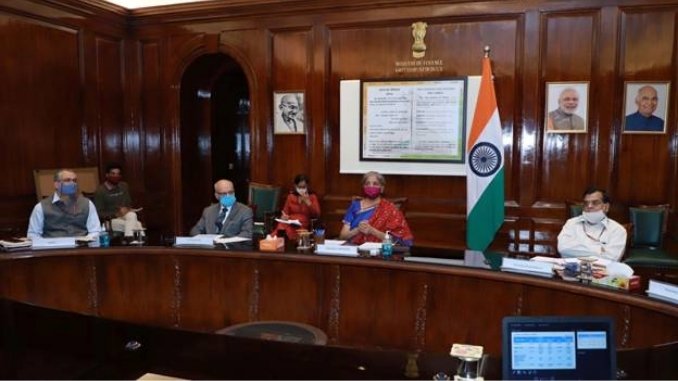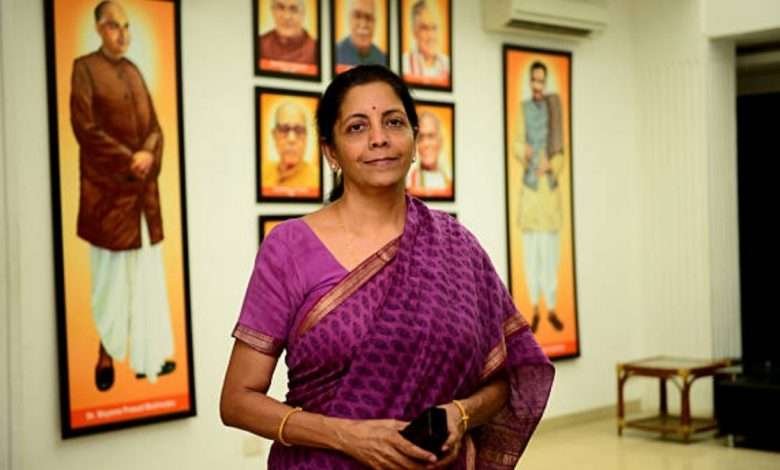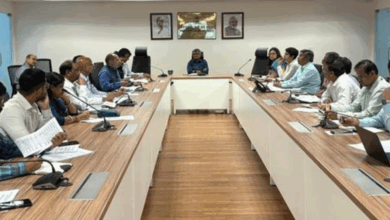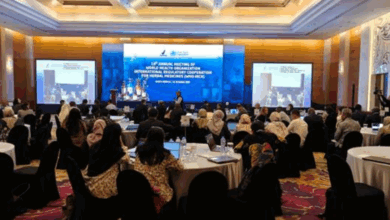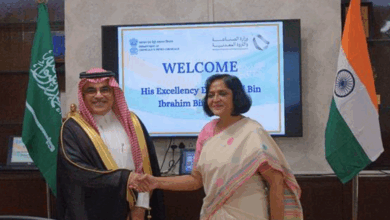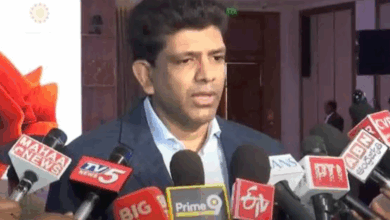Finance Minister chairs a session on ‘Maritime Financing, Insurance and Arbitration’ in the Global Maritime India Summit (GMIS) 2023
The India-Middle East-Europe economic corridor to be the maritime way to reach Europe that cuts out on logistics costs : Union Finance Minister
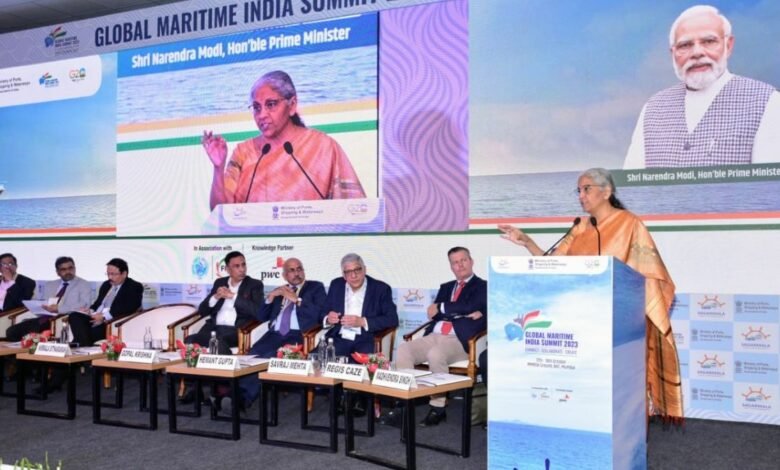
Union Finance and Corporate Affairs Minister Nirmala Sitharaman said that financing, insurance arbitration and the creation of more diverse options are required to boost the country’s shipbuilding capacity. The Finance Minister was addressing a session on ‘Maritime Financing, Insurance and Arbitration’ at the Global Maritime India Summit (GMIS) 2023, in Mumbai yesterday.
Speaking about the India-Middle East-Europe economic corridor, Finance Minister Nirmala Sitharaman said, “We are looking at reaching Europe, Central Asia through maritime plus land route, thus cutting out on logistics costs”.
FM Nirmala Sitharaman said that GMIS 2023 is important because it is being held at a time when globally there is a lot of challenges – in the security of supply, in disruption of supply, in value chains being broken. Shipments of major commodities are at risk sometimes, and food insecurity and energy insecurity all creep in because of this and add to inflation. Economies that are coming out of COVID are facing this challenge, she added.
The Union Finance Minister Nirmala Sitharaman informed that a “Marine Cargo Pool” was created with the support of IRDAI and domestic insurance companies’ insurers together with General Insurance Corporation of India Limited (GIC Re) in the aftermath of COVID to support maritime trade. FM also said that the Insurance Regulatory & Development Authority of India (IRDAI) has approved a series of modifications in the reinsurance sector to support growth avenues in India’s Blue economy services with maritime reinsurance, and bringing in a greater number of reinsurers to set up their operations in India.
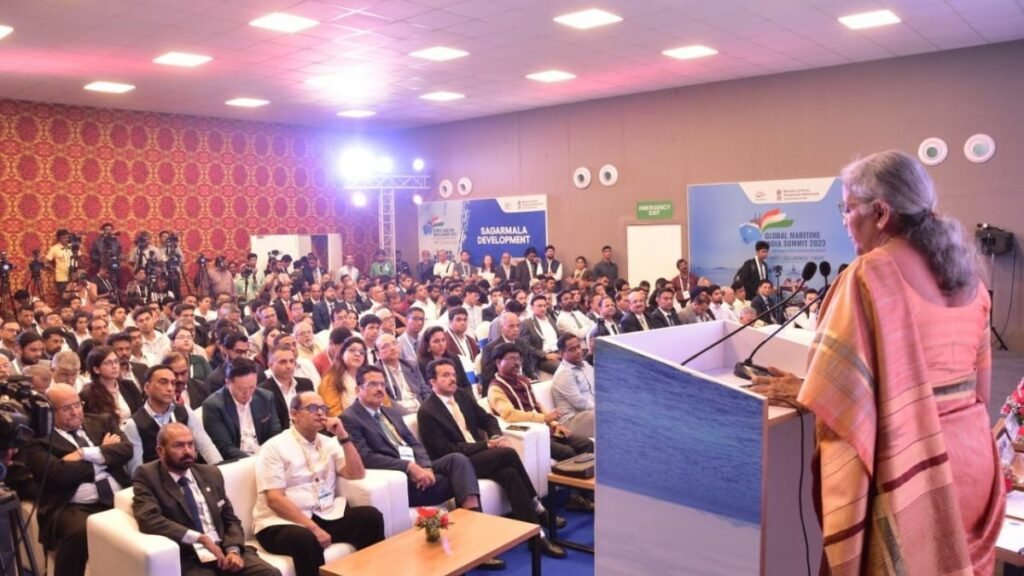
Speaking about arbitration, Finance Minister Nirmala Sitharaman informed that India has passed an arbitration bill, has got an arbitration centre and is improving its strength in arbitration. FM said that a need has been felt to have a full-fledged Indian-owned and India-based Protection and Indemnity (P&I) entity in order to: 1) Reduce India’s vulnerability to international sanctions and pressures and to provide greater strategic flexibility in shipping operations. 2) Provide protection of liabilities to the ships operating in coastal waters as well as inland waters during their operation. 3) Provide India with a foothold into the specialized segment of the Protection and Indemnity (P&I) business, which is currently dominated by very few players internationally where India does not have any presence and 4) Indian Protection and Indemnity (P&I) services can also help in encouraging and increasing Maritime arbitration in India.
The Finance Minister stated that an expert committee has also been constituted to relook at the Harmonized Master List (HML) and to streamline the understanding of infrastructure among all financing/regulatory institutions. The framework being developed by this committee would be instrumental in updating HML from time to time to categorize relevant sectors as infrastructure.
A full-fledged Indian-owned and India-based Protection and Indemnity (P&I) entity required to encourage maritime arbitration in India: Finance Minister
The Finance Minister said that 31 projects have been identified in 9 major ports for monetisation under the National Monetisation Pipeline (NMP) launched in 2022 with a total estimated capex of Rs 14,483 crore for FY 2022-25.
The Finance Minister also informed about the establishment of ‘SAROD-Ports’ (Society for Affordable Redressal of Disputes – Ports) which provides an alternative dispute resolution (ADR) mechanism.
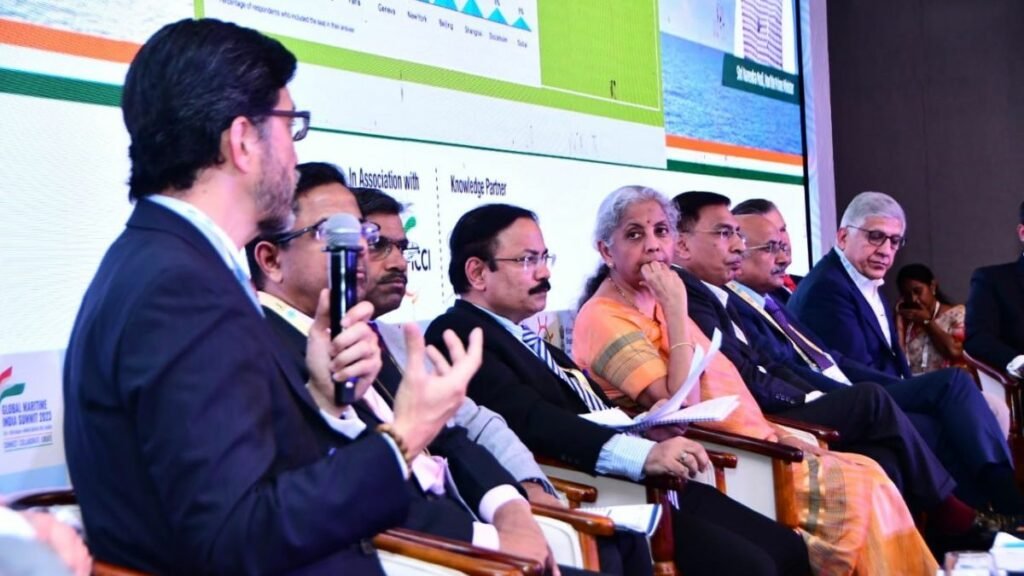
The Finance Minister also stated that India has risen in the Global Ranking in the International Shipments category from 44th rank in 2014 to 22nd in 2023. She mentioned that the World Bank’s Logistics Performance Index report 2023, the “Turn Around Time” of Indian ports is now 0.9 days, which is less than countries like Singapore (1 day), UAE (1.1 days), Germany (1.3 days), USA (1.5 days), Australia (1.7 days), Russia (1.8 days) and South Africa (2.8 days).
FM Nirmala Sitharaman also spoke about the IFSCA located in GIFT City which notified ‘ship lease’ as a financial product, and provided a framework for enabling ship finance and operating leases through the ‘Framework for Ship Leasing’. Various tax incentives and exemptions are offered for ship-leasing entities in the IFSC, including tax holidays for 10 years, no capital gains during tax holding, stamp duty exemption for five years, etc. Additional exemptions have been granted on income generated by way of royalty or interest paid on account of the lease of the ship to foreign entities and ‘no Capital Gains tax’ on the transfer of the ship by an IFSC Unit enjoying 100% tax exemption. The Government of India, in the Union Budget 2022, provided for the establishment of an International Arbitration Centre (IAC) in GIFT City to provide a faster dispute resolution process, informed the Finance Minister.
Speaking on how the Union Government has prioritized port-led development in the last nine years, FM highlighted various maritime-related policies and financial support given by the Centre, like:
- 75% of the FDI received in the sea transport sector between 2000 and 2023 happened in the last 9 years – The sea transport sector has received FDI inflows of more than USD 4.2 billion over the last 9 years
- The total cargo handling capacity of Indian ports has almost doubled – from nearly 1,400 Million Tonnes Per Annum (MTPA) in 2014 to more than 2,600 MTPA.
- Cargo volumes have more than doubled – from 74 MTPA in 2014-15 to 151 MTPA in 2022-23.
Disclaimer: This is an official press release by Pib.

